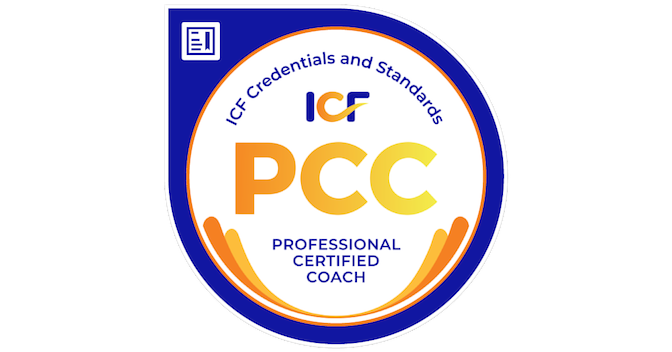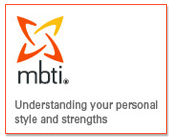Latest Blog Posts
2. October 2011
A little less fresh and enthusiastic, the group set out for a 20+ km walk today. Group dynamics being what they are, the norming has set in: they’ve got the routine down…get up, eat, bandage/cream/lube up the feet, and pop on the boots. Get water bottles and Camelbaks filled and pile into the van for a drive to the day’s embarkation point. Find your favorite walking partner (iPod or human) and head out. Be sure to sit in the same seat in the van, or at the breakfast table, too.
We’re such creatures of habit, believing there’s safety and security in a predictable routine. When we get the least thrown off – having the group leader take away your pack and request that you walk without it for a half hour, or switch seats in the car – we’re flustered, confused and frustrated.
Our brains LOVE predictability. They’ve got such a big job to do each day, sifting through billions of stimuli to find and focus on what matters to us. When we throw them off by breaking out of a rut, it feels tough. We even get headaches.
When was the last time you upset the status quo in your group (family, colleagues, friends, etc.)? What do you believe will happen? Are you sure it will?
Disrupting your group’s routine may generate some “storming,” but it’s well worth the calm and peace that come afterward.
1. October 2011
Today was the day that the worst imaginable happened: My body ached and I couldn’t keep up with the group. I told them to go on ahead when I really wanted someone to stay with me and cheer me on. We agreed to meet at km marker 100, and when I finally stumbled up, they weren’t there. No note (as others left for their traveling companions), no clue how far ahead they were. I’d just climbed a big hill filled with huge rocks and teetered, sweated and rushed because I wanted to catch up. And they weren’t there.
So, for a second I felt sorry for myself. Abandoned, left behind, uncared for – pick any version of the “poor me” story, and I was all over it. And then I remembered: I’d told them to go ahead so they could enjoy their walk. Despite aching hips and ankles, a pounding heart and a lot of dizziness, I could still walk a bit. It was a sunny day and there were people walking by who’d likely help me IF I’D JUST ASK.
Man, that asking for help business is tough. “No, I’ll be fine,” I said to one woman who noticed I’d stopped to bend over and stretch and asked if I needed help. Then, when I hobbled to a little café and ordered a sandwich, I analyzed the situation: dizzy, no water left in my pack, and an aching body…but a phone nearby to call our driver for help. But no. I decided to keep walking. I lasted about 50 yards. And then I felt my heart pounding.
Suddenly, I realized that keeping up appearances, showing the world I could do something that felt utterly stupid at the moment, was…um, stupid. In broken Spanish, I asked the lady behind the bar to call Carlos, our driver and Remover Of All Obstacles. I said “come get me off this Camino.” And he did.
We spent the remainder of the afternoon together, “leap-frogging” over the walkers, to ensure that everyone in our group made it safely to today’s endpoint. We dispensed water, laughs and encouragement. And a funny thing happened: each group member told me they were so glad to see me in the van because it gave them the permission to stop, too, if they wanted.
Although they didn’t wait at the mileage marker, they did leave me some encouragement along the way:
So, what was today’s lesson? People want to help. Get over yourself and ask.
Back in my HR and training days, we talked a lot about group dynamics. When a group of people come together, there’s a process that typically transpires: Forming, Norming, StormStng and Performing.
Forming is what our little band of “caministas,” as we call the women who are on this retreat with us, is busy doing now. Chattering about what they do, asking questions about the trip’s logistics, and what they packed is slowly being replaced by topics such as encounters with the Divine, emotional baggage they’ll leave behind here, and what worries them most about returning to “real” life
Essentially, we humans are meant to connect; from infancy on, we’ve looked into the eyes of others to see what impression we’re making, whether or not we’re making ourselves understood, and if we can forge a bond that will support us in some way. It’s a natural, evolutionary process. Still, watching this committed, powerful and divine group gel so quickly is awe-inspiring. There’s some seriously good mojo here, and they’re all feeling it.
Take a sec to think about the groups in your life: family, colleagues, circle(s) of friends, etc. In which group(s) are you willing to dive deep and feel a delicious connection? What is it about the people that feels so good. The traits you’re drawn to in others are an important clue. They’ll show you what you aspire to, what you want more/less of, and remind you of your values. And that, friends, will provide great data for the next step on your journey.
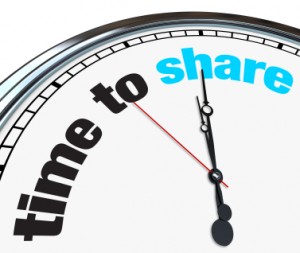 A cynical relative recently expressed concern about how much time I spend volunteering for a non-profit organization. She said “aren’t you forgetting your business?” I heard the well-meaning intention, but also the fear that if I don’t keep my nose to the proverbial grindstone all the time, I’ll wind up living under a bridge.
A cynical relative recently expressed concern about how much time I spend volunteering for a non-profit organization. She said “aren’t you forgetting your business?” I heard the well-meaning intention, but also the fear that if I don’t keep my nose to the proverbial grindstone all the time, I’ll wind up living under a bridge.
I get it. Totally. I used to be like her. But not anymore. There was no defining moment where the proverbial light bulb went on, but rather a gradual softening…sort of a gentling of my spirit. I suspect it was due to a combination of maturation and the hard knocks that come with being alive. Who knows.
What I know for sure (to borrow a phrase from Oprah) is that we’re put on this planet to love and serve. To use our passions and talents to leave this place a little better than we found it. In all areas of my life, I now look for opportunities to love and serve. It may mean holding open a door, speaking pro bono to job-seekers, or the volunteering that troubled my relative.
I’ve learned that by giving, I receive far more than I ever gave. It’s not usually a direct, linear, tit-for-tat sort of thing, but there’s no mistaking the fact that my life is far richer since making a more concerted effort to help others. If you’re unemployed or in the wrong career, volunteer for an organization that will help you gain skills while making a contribution. If you can’t sort out a problem of your own, helps someone else solve theirs. Share job leads. Write a Linked In recommendation for someone whose work you admire. When you network, aim to meet people whom you can help, rather than who can help you. Teach someone to read.
Generosity of spirit and resources creates a connection to the abundance of life. “Woo-woo,” I know, but oh so true. Just give, and watch what happens.
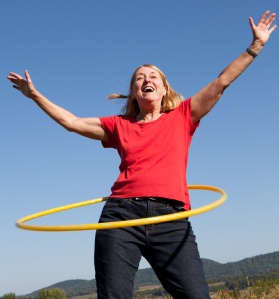 I’m writing this in the living room of the house in which I grew up. Having temporarily moved in to help my mother with post-surgery rehab, I find myself revisiting old summertime rituals. If you’ve been following me on Facebook lately, you know I’ve bought a hula hoop, run through a sprinkler, hung laundry on a clothesline and have eaten a lot of watermelon. I kid you not – the ice cream truck drove by about ten minutes ago and it was all I could do not to run after it.
I’m writing this in the living room of the house in which I grew up. Having temporarily moved in to help my mother with post-surgery rehab, I find myself revisiting old summertime rituals. If you’ve been following me on Facebook lately, you know I’ve bought a hula hoop, run through a sprinkler, hung laundry on a clothesline and have eaten a lot of watermelon. I kid you not – the ice cream truck drove by about ten minutes ago and it was all I could do not to run after it.
While it’s lovely to revisit childhood traditions, I’m not getting much work done. I tell myself it’s because I’m cooking, cleaning, running Mom back and forth to physical therapy appointments and doing laundry. But it’s not, really. There are plenty of schedule gaps where the chores have been done and Mom wants for nothing.
So what gives? Why am I not squeezing in more time catching up on business reading, blogging, clearing out old emails, or creating new programs and offerings? I blame it on The Battle In My Head.
The Battle goes like this: “You should work harder,” says the Judgy Tyrant who’s all business and spends her life wagging her finger in disapproval. “You should play harder,” says the watermelon- and sprinkler-loving kid in me. These days, I’m letting the kid win. Sure there’s the occasional thought that I’m a total slacker and I’ll starve to death, but it passes oh-so-quickly.
It wasn’t always that way. Before I made a decision to honor what feels right, right down to my bones, I used to do a lot of things because “that’s the way you’re supposed to do it,” or “because it makes good business sense,” or “because it’s logical.” And I often found myself in situations where I wasn’t engaged, had nothing to offer and was bored silly.
Forcing yourself to follow others’ rules, to work when there’s just no mojo to be found, is just plain dumb. Playing is what keeps us creative. I’ve learned that if I can’t easily find an answer to some question, it’s time to set the question aside and play a bit. Our bodies learn and create better when we’re moving. Hula hooping, even as badly as I do it, is a way to stimulate the right side of my brain.
I often tell clients to make stuff. Any kind of stuff – placemats, finger paintings, potholders, watercolors – will do. Creating helps them access wisdom they’re not tapping into now. By doing the unexpected thing, eventually something jogs loose in one’s brain. Ideas will come. And if you don’t believe me, how ’bout Albert Einstein? He said “We can’t solve problems by using the same kind of thinking we used when we created them.”
So, if you’re feeling stuck, unsure of what to do next, I highly recommend a run through the sprinkler.
 Our friend and fellow coach, Michael Trotta, was so excited about our upcoming retreat in Spain that he decided to interview Susan Baghdadi and me about it.
Our friend and fellow coach, Michael Trotta, was so excited about our upcoming retreat in Spain that he decided to interview Susan Baghdadi and me about it.
I thought you might like to hear the story behind the retreat – why we created it, what our intentions are for it, and what you can expect if you join us (or just live vicariously through us) on the Camino de Santiago.
Here’s the recording:
 I’ve recently had the misfortune of experiencing truly horrible service from a company of whose I’ve been a long time customer. I wrote emails, I called, I begged for them to come do what they promised and install my deck’s awning…and no one listened or responded in any fashion, for months.
I’ve recently had the misfortune of experiencing truly horrible service from a company of whose I’ve been a long time customer. I wrote emails, I called, I begged for them to come do what they promised and install my deck’s awning…and no one listened or responded in any fashion, for months.
The culmination of all that neglect led me to drive way too fast down I-95 this week with the intent of forcing a showdown at their offices. I wasn’t gonna go postal or anything, but I kept thinking “these people have to pay for what they did.” I was gonna let ’em have it.
When I got there, I found a man working while his boss (the target of my anger) was “at the store.” Deflated, I looked around. Dirty, disorganized, junk strewn everywhere, a company vehicle with a bashed in window…not exactly the kind of place that instills confidence in a customer. I waited a while, then found my awning lying in a heap in a corner. I picked it up, folded it, and left the premises. On the ride home I was a little calmer but still had the “they should pay” story going on in my head.
Then I got coached. When the coach called, I trotted out my tale about the awning. She helped me see that my “they should pay” story was keeping me stuck in a loop of anger and frustration.
So I changed my thinking to “they’re already paying.” How did I know they were “paying”? Their voicemail boxes were full (every one of them – I called ’em!), probably with angry customers’ complaints. Their finances were likely so bad they couldn’t maintain their vehicles, and they lost a customer (me) that day.
The coach asked me to think about the head of that company, knowing that he was already paying. Suddenly I was able to let the anger go and think instead with compassion for him. I don’t know what’s going on with him or why his employees behave the way they do, but I’m free to find a company that feels better to me, and I’m not stuck feeling crappy anymore. In fact, I found someone who showed up on time, repaired stuff the other company didn’t notice, suggested ways to extend the life of the awning’s fabric, and charged me less than the other company would have.
So why did I tell you this little story? Because when you’re angry, hurt, or anything other than joyful, you’ve created a story about your circumstances that just doesn’t serve you. The energy you’re devoting to making someone – a toxic boss, the person who didn’t hire you, or the colleague who stole the credit for your hard work – wrong is keeping you from finding an opportunity or situation that’s right for you.
Compassion for yourself first, and then for others, will always help you find the truth – your true calling, the truest expression of your creativity, a work environment that lets you be yourself, etc. And, the truth brings peace.
 I have several friends who are going through profoundly difficult challenges in their lives right now: protracted unemployment, homelessness, disease, intense physical pain, money woes…truly big stuff. If I were in charge, I’d wave my magic wand and erase it all from their lives, but I don’t have the power to do that. So I do what I can – offer a shoulder, a hug, a tissue, a meal, a distraction for a little while – some small gesture that is in my power to make.
I have several friends who are going through profoundly difficult challenges in their lives right now: protracted unemployment, homelessness, disease, intense physical pain, money woes…truly big stuff. If I were in charge, I’d wave my magic wand and erase it all from their lives, but I don’t have the power to do that. So I do what I can – offer a shoulder, a hug, a tissue, a meal, a distraction for a little while – some small gesture that is in my power to make.
In her Cycle of Change model (described in Finding Your Own North Star), Martha Beck calls this Square One – Death and Rebirth. It’s the death of an old way of being (healthy, employed, pain-free, etc.), and a time to acknowledge just how powerless you feel – and are. Beck says the motto of this time in one’s life is “I don’t know what the hell is going on, and that’s okay.”
12 Step program participants learn that Step One, the one that comes before all the “doing” found in the remaining 11, is “we admitted we were powerless…” (over drugs, alcohol, shopping, gambling, cheating, etc.). They can skip that step, glossing over the notion, but if they do, participants always end up back where they started.
Square One. Step One. Call it what you want, but it’s a time to just let go, give in to the fact that life sucks at the moment, and admit we don’t have all the answers. I’ve noticed that when each friend gives herself over to the loss of control she’s experiencing and acknowledges that she’s not always in charge, a moment of grace, a smidgen of peace and help always arrive in one form or another.
Why is powerlessness so valuable? Because there’s truth there, and telling the truth always sets you free. Recognizing that life as you’ve known it is unmanageable (as they say in “the rooms” of 12 Step programs), that pretending all is well when it’s not is a struggle that’s worth giving up, feels so much better than faking it.
Whether you’re a believer in a higher power or not is your business. Personally, I’ve seen far too much grace and everyday miracles in the lives of the people I mentioned above (and in my own) to doubt the power of some unseen force(s) partnering with us on this journey called Life.
Suffering ends, one way or another, and then it comes back again somewhere down the road. That’s just the way of things. But if we see the time of suffering as a dissolution of what was, choose not to fight the painful reality and instead acknowledge that it’s a rotten time, we might just notice that there will soon be an opportunity to create something new. And then, somehow, it all gets just a little easier. And that, my friends, is the sweet spot in which new lives and careers are born.
Lately, I’ve been thinking a lot about the importance of community. And then I spotted this sign:
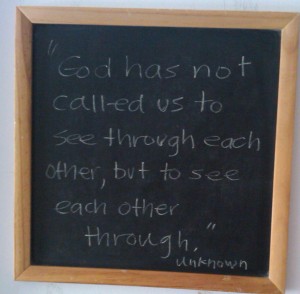
Who are you seeing through, and who sees you through? Be grateful for the people on this list, and decide to see someone through today in some small way. There’s nothing like helping others to help yourself; finding your right life becomes a lot easier when you’re focused on love.
 My client (we’ll call her Nancy) was paralyzed by a question that so many of us get stuck on when we’re trying to incorporate our passions into our lives: How will I know when this is happening?
My client (we’ll call her Nancy) was paralyzed by a question that so many of us get stuck on when we’re trying to incorporate our passions into our lives: How will I know when this is happening?
We want so badly to quantify and measure the progress of creating our right lives and careers, naming milestones and benchmarks to help us stay on the path.
The bigger picture emerged. It was all about her body, her senses, about cosmic help, about inner knowing, love, the assurance of feeling a definite sense of purpose, and an energy of wanting to burst forth. Nothing looked like the traditional, quantifiable SMART goal setting stuff we usually generate; you know, the “by June 4 I’ll have a resume written” or “I’ll have six new clients,” or “I’ll have lost 10 lbs” kind of measurements.
Despite my asking the same questions as in her book, Nancy was able to respond to them in a new way because she wasn’t filling in the blanks. Freed of the structure that made her “go left” and asking for someone to help her, Nancy’s right brain could engage and really feel the responses. They were remarkable.
If you find yourself stuck in left brain model, attempting to apply a linear, rational, and logical approach to your problem, stop. Get someone else to handle the left-brained stuff for a while and just focus on the feelings – the emotions and bodily sensations – of what it’d be like to have the things you desire. Make a vision board. Imagine your future, successful self being interviewed by a magazine you read and enjoy – and let someone ask you questions as if you were that future self. Ask your 80 year old future self to give you some advice. Finger paint. Watch this video. Just don’t do what you’ve always done and expect different results.
Surprise yourself.


